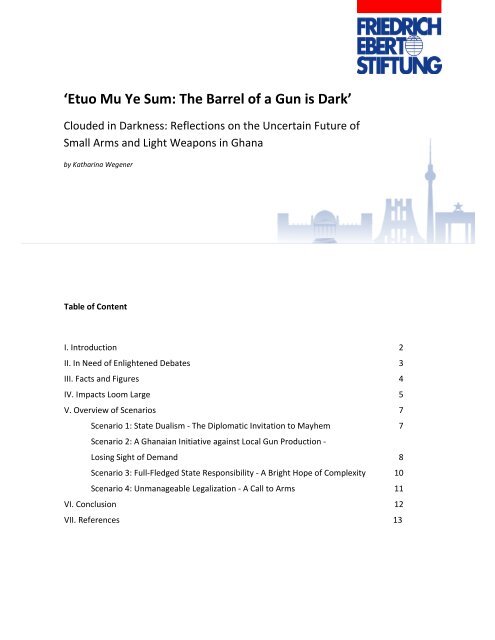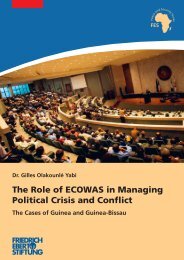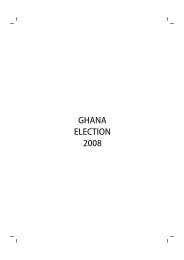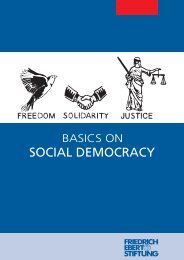'Etuo Mu Ye Sum: The Barrel of a Gun is Dark' - Clouded in Darkness
'Etuo Mu Ye Sum: The Barrel of a Gun is Dark' - Clouded in Darkness
'Etuo Mu Ye Sum: The Barrel of a Gun is Dark' - Clouded in Darkness
- No tags were found...
Create successful ePaper yourself
Turn your PDF publications into a flip-book with our unique Google optimized e-Paper software.
‘Etuo <strong>Mu</strong> <strong>Ye</strong> <strong>Sum</strong>: <strong>The</strong> <strong>Barrel</strong> <strong>of</strong> a <strong>Gun</strong> <strong>is</strong> Dark’<strong>Clouded</strong> <strong>in</strong> <strong>Darkness</strong>: Reflections on the Uncerta<strong>in</strong> Future <strong>of</strong>Small Arms and Light Weapons <strong>in</strong> Ghanaby Kathar<strong>in</strong>a WegenerTable <strong>of</strong> ContentI. Introduction 2II. In Need <strong>of</strong> Enlightened Debates 3III. Facts and Figures 4IV. Impacts Loom Large 5V. Overview <strong>of</strong> Scenarios 7Scenario 1: State Dual<strong>is</strong>m - <strong>The</strong> Diplomatic Invitation to Mayhem 7Scenario 2: A Ghanaian Initiative aga<strong>in</strong>st Local <strong>Gun</strong> Production -Los<strong>in</strong>g Sight <strong>of</strong> Demand 8Scenario 3: Full-Fledged State Responsibility - A Bright Hope <strong>of</strong> Complexity 10Scenario 4: Unmanageable Legalization - A Call to Arms 11VI. Conclusion 12VII. References 13
I. IntroductionSmall Arms and Light Weapons certa<strong>in</strong>ly belong to the most current topics <strong>in</strong> security-relatedstudies <strong>of</strong> African states. In the case <strong>of</strong> Ghana, wide range <strong>of</strong> newspaper articles concern<strong>in</strong>gcrim<strong>in</strong>al abuses and dangers <strong>of</strong> firearms report a delicate gun situation <strong>in</strong> one <strong>of</strong> WestAfrica’s most stable democracies. However, it <strong>is</strong> widely acknowledged that little hard factsare known about the true extent <strong>of</strong> the proliferation <strong>of</strong> small arms and light weapons andarmed violence on the ground. Th<strong>is</strong> <strong>is</strong> not surpr<strong>is</strong><strong>in</strong>g consider<strong>in</strong>g that small arms ma<strong>in</strong>lycirculate illicitly and armed violence <strong>is</strong> widely beyond public control. In 2001 the GhanaianGovernment carried out a voluntary arm collection programme be<strong>in</strong>g titled: “Etuo Me <strong>Ye</strong><strong>Sum</strong>” or <strong>in</strong> Engl<strong>is</strong>h “<strong>The</strong> <strong>Barrel</strong> <strong>of</strong> a <strong>Gun</strong> <strong>is</strong> Dark” which <strong>in</strong>troduced further campaigns.Interest<strong>in</strong>gly enough, th<strong>is</strong> experience reveals that there are <strong>in</strong>deed more aspects <strong>of</strong> darknessregard<strong>in</strong>g the proliferation <strong>of</strong> small arms <strong>in</strong> Ghana. For <strong>in</strong>stance, it has never come to lighthow many small arms have been recollected <strong>in</strong> Ghana (An<strong>in</strong>g, 2001). However, what hasbeen reported <strong>is</strong> that the Chief <strong>of</strong> Police Operation Adu-Gyimah was accused <strong>of</strong> “provid<strong>in</strong>g”armed robbers with some <strong>of</strong> the seized guns and was d<strong>is</strong>m<strong>is</strong>sed from h<strong>is</strong> position <strong>in</strong> thesame year (An<strong>in</strong>g, 2010). <strong>The</strong>se anecdotal pieces <strong>of</strong> background <strong>in</strong>formation beh<strong>in</strong>d “<strong>The</strong><strong>Barrel</strong> <strong>of</strong> a <strong>Gun</strong> <strong>is</strong> Dark” speak volumes: <strong>The</strong>re are numerous nebulous mechan<strong>is</strong>ms,relationships and facts that have to be taken <strong>in</strong>to account <strong>in</strong> order to understand thedynamics beh<strong>in</strong>d the gun problem <strong>in</strong> Ghana. Th<strong>is</strong> paper aims to shed light on the realitiesand secrets <strong>of</strong> small arms and light weapons proliferation <strong>in</strong> Ghana, a phenomenon that <strong>is</strong><strong>of</strong>ten conjured, but understood very poorly.Ghana <strong>is</strong> known as one <strong>of</strong> the most secure Sub-Saharan African states with crime rates evenlower than those <strong>of</strong> certa<strong>in</strong> highly <strong>in</strong>dustrialized countries. As an illustration, the rate <strong>of</strong>robberies <strong>in</strong> Ghana <strong>in</strong> the year 2000 was lower than <strong>in</strong> Japan. However, th<strong>is</strong> positive trendseems to go <strong>in</strong>to reverse with firearm related crime rates overall r<strong>is</strong><strong>in</strong>g <strong>in</strong> Ghana. <strong>The</strong>re <strong>is</strong> agreat level <strong>of</strong> <strong>in</strong>security as to how the security situation <strong>in</strong> Ghana will develop <strong>in</strong> the com<strong>in</strong>gyears and how Ghanaians might react to a less favourable security situation, eventuallylead<strong>in</strong>g to new dynamics. Seen from a different perspective, it can be debated whether thesurplus <strong>of</strong> guns <strong>is</strong> the root <strong>of</strong> deteriorat<strong>in</strong>g security situation or not.With so many open questions <strong>in</strong> m<strong>in</strong>d it might seem completely unreal<strong>is</strong>tic to talk aboutfuture developments <strong>of</strong> SALW proliferation <strong>in</strong> Ghana. Indeed, the proliferation <strong>of</strong> SALW <strong>in</strong>Ghana <strong>is</strong> a problem with high levels <strong>of</strong> uncerta<strong>in</strong>ty. For th<strong>is</strong> reason, th<strong>is</strong> paper will <strong>in</strong>troducefour scenarios <strong>of</strong> the future proliferation <strong>of</strong> SALW <strong>in</strong> Ghana. As we know from severalillum<strong>in</strong>at<strong>in</strong>g scenarios, such as the Mont Fleur Project which <strong>in</strong>troduced outlooks <strong>of</strong> postapartheidSouth Africa, scenarios do not aim to present def<strong>in</strong>ite truths or forecasts, howeverthey should stimulate debates about the future. With th<strong>is</strong> <strong>in</strong> m<strong>in</strong>d, th<strong>is</strong> scenario-build<strong>in</strong>g canhelp to d<strong>is</strong>cuss plausible mechan<strong>is</strong>ms and factors that are crucial for the development <strong>of</strong>small arms proliferation <strong>in</strong> Ghana.First <strong>of</strong> all, some basic facts <strong>of</strong> today’s guns situation <strong>in</strong> Ghana and different debates aroundsmall arms shall be exam<strong>in</strong>ed. Specifically, the extent <strong>of</strong> the problem <strong>in</strong> concrete facts and <strong>in</strong>perceivable impacts shall be described <strong>in</strong> order to provide background knowledge. In thenext step, four scenarios on small arms proliferation will be presented. <strong>The</strong>se outlooks revealthe mean<strong>in</strong>g <strong>of</strong> different variables and strategies for the solution <strong>of</strong> the problem.2
II.In Need <strong>of</strong> Enlightened DebatesPublic and <strong>of</strong>ficial d<strong>is</strong>course center<strong>in</strong>g on Ghana’s gun-problem can be broken down <strong>in</strong>todifferent debates. Beside these ma<strong>in</strong>stream d<strong>is</strong>cussions, alternative debates are <strong>in</strong>deedtriggered, but have reached meagre attention with policy-makers and the general public.Aga<strong>in</strong>st the background <strong>of</strong> multiple civil wars <strong>in</strong> the 1990ies, the <strong>in</strong>ternational communitybegan to express its grow<strong>in</strong>g concern about the proliferation <strong>of</strong> small arms and lightweapons (SALW) 1 , a type <strong>of</strong> armoury which lethality had rema<strong>in</strong>ed unnoticed for a long time,especially <strong>in</strong> compar<strong>is</strong>on to spotlighted landm<strong>in</strong>es. With th<strong>is</strong> new momentum to curb SALW<strong>in</strong> less developed and fragile states, the member states <strong>of</strong> the Economic Community <strong>of</strong> WestAfrican States (ECOWAS) accepted small arms as a security problem and elaborated avoluntary Moratorium that was later on transformed <strong>in</strong>to the ECOWAS Convention on SmallArms and Light Weapons. In l<strong>in</strong>e with th<strong>is</strong> new wave <strong>of</strong> crim<strong>in</strong>al<strong>is</strong>ation <strong>of</strong> small arms on the<strong>in</strong>ternational stage the debate <strong>of</strong> how production and trade <strong>of</strong> small arms can be regulatedwas will<strong>in</strong>gly carried on <strong>in</strong> Ghana.Another debate which <strong>is</strong> deeply anchored <strong>in</strong> the general public resolves around chang<strong>in</strong>gcrime patterns <strong>in</strong> Ghana. Evidently, the perceived and real crime situation <strong>in</strong> Ghana hasdeteriorated <strong>in</strong> the course <strong>of</strong> the last years. <strong>The</strong> <strong>is</strong>sue that worries Ghanaians <strong>is</strong> the question<strong>of</strong> how to end armed robberies which are frequently carried out with small arms.Consequently, the d<strong>is</strong>cussion regard<strong>in</strong>g small arms control <strong>in</strong> Ghana <strong>is</strong> limited to firearmrelatedcrimes, illegal production and the general threat that firearms mean to any society.New debates should pick the non-crim<strong>in</strong>al use and longstand<strong>in</strong>g omnipresence <strong>of</strong> weapons<strong>in</strong> many societies as a central theme. Focus<strong>in</strong>g on small arms as a security problem causedby crim<strong>in</strong>als, little attention <strong>is</strong> paid to the rationale beh<strong>in</strong>d the wide Ghanaian gun culture:What <strong>is</strong> the true problem beh<strong>in</strong>d the possession <strong>of</strong> guns? Further, attention ought to be paidto the <strong>in</strong>d<strong>is</strong>cernible effects <strong>of</strong> the proliferation <strong>of</strong> SALW <strong>in</strong> Ghana. More action needs to bedone to <strong>in</strong>vestigate <strong>in</strong>to SALW-related violence <strong>in</strong> the domestic context. Similarly, littleattention <strong>is</strong> paid to the fact that Ghanaian small arms do have negative effects on the widersub-region. An important question to ask <strong>is</strong>: Where does the current debate lack scrut<strong>in</strong>yand v<strong>is</strong>ion to grasp the multilevel implications <strong>of</strong> the grow<strong>in</strong>g SALW proliferation <strong>in</strong> Ghana?To refer to some <strong>of</strong> these questions mentioned, it <strong>is</strong> important to take a look at the rationaleand the <strong>is</strong>sues beh<strong>in</strong>d the acqu<strong>is</strong>ition <strong>of</strong> guns. In fact, guns have rich symbolic mean<strong>in</strong>gs andpractical significance <strong>in</strong> pre-state Ghanaian society; to name a few, the protection <strong>of</strong> cattle,and the representation <strong>of</strong> manhood, self-defence, hunt<strong>in</strong>g and ceremonial purposes. Onecould argue that guns do not necessarily have negative implications for peace and security.However, when guns become the <strong>in</strong>dividual warrantor <strong>of</strong> security, because security <strong>is</strong> notprovided by any collective body, the proliferation <strong>of</strong> guns <strong>is</strong> a h<strong>in</strong>t for state’s failure toprovide high levels <strong>of</strong> security or arguably security <strong>in</strong> general.<strong>The</strong>re <strong>is</strong> the argument that the whole understand<strong>in</strong>g <strong>of</strong> security <strong>in</strong> newly <strong>in</strong>dependentAfrican states has always been about the well-be<strong>in</strong>g and survival <strong>of</strong> the state itself. However,it did not <strong>in</strong>clude human security, a people-centred concept that summarizes the manifoldbasic needs to which all human be<strong>in</strong>gs are naturally entitled to. One illustration <strong>of</strong> theh<strong>is</strong>torical absence <strong>of</strong> human security prov<strong>is</strong>ion <strong>is</strong> given by crim<strong>in</strong>olog<strong>is</strong>t Justice Tankebe, who1 By def<strong>in</strong>ition, small arms are designed for <strong>in</strong>dividual use (such as p<strong>is</strong>tols, rifles etc.) whereas light weapons aredesigned to be used by two or three persons (such as heavier mach<strong>in</strong>e guns).3
elaborated on the role <strong>of</strong> polic<strong>in</strong>g <strong>in</strong> Ghana (2008, 2009). He draws us to the fact that policeservice has been <strong>in</strong>troduced by and for the safety <strong>of</strong> colonial mastery and was used aga<strong>in</strong>stGhanaians with a great share <strong>of</strong> arbitrar<strong>in</strong>ess. Fatally enough, <strong>in</strong> the post-colonial state thepolice service has not been transformed <strong>in</strong>to a pure community-oriented <strong>in</strong>stitution. Instead,it cont<strong>in</strong>ued to operate <strong>in</strong> the agency <strong>of</strong> the m<strong>in</strong>ority elit<strong>is</strong>ts for example dur<strong>in</strong>g the militaryrule under J. J. Rawl<strong>in</strong>gs. Accord<strong>in</strong>g to the Ghana Integrity Initiative, nearly 80 per cent <strong>of</strong>Ghanaians see the police as the most corrupt <strong>in</strong>stitution <strong>in</strong> their country today (2005). In allth<strong>is</strong>, vigilant<strong>is</strong>m which <strong>is</strong> the immediate and violent self-help among citizens faced withcrimes <strong>is</strong> fairly widespread <strong>in</strong> Ghana. <strong>The</strong>se observations are symptomatic for the citizens’mouldy judgement <strong>of</strong> the state’s exerc<strong>is</strong>e <strong>of</strong> legitimate power and accentuate the need tolook at those problems that cannot be solved by blanket policies focus<strong>in</strong>g on weapons alone.In regard to the question about what <strong>is</strong> m<strong>is</strong>s<strong>in</strong>g <strong>in</strong> the debate, it can be observed that theimplications <strong>of</strong> SALW proliferation <strong>in</strong> Ghana for different societal groups have been too littled<strong>is</strong>cussed. Armed robberies have been picked out as one <strong>of</strong> the central themes deal<strong>in</strong>g withthe SALW problem, but there are more problems on different levels. So far, too little <strong>is</strong>known about the role <strong>of</strong> small arms with regard to human rights <strong>in</strong>fr<strong>in</strong>gements.Understand<strong>in</strong>g the gun situation <strong>in</strong> Ghana <strong>is</strong> hampered by the wide gap <strong>in</strong> crim<strong>in</strong>ologicalknowledge about crime patterns and perpetrators pr<strong>of</strong>iles. Just as much, it <strong>is</strong> time to facethe fact that plenty <strong>of</strong> arms and light weapons are be<strong>in</strong>g exported from Ghana <strong>in</strong>to thefragile countries <strong>in</strong> the West African sub-region, such as Ivory Coast. <strong>The</strong>se objections to thelimited debate are voiced to remember the fact that a possible securitization <strong>of</strong> the SALWproblem <strong>in</strong> Ghana will untimely restrict lots <strong>of</strong> analys<strong>is</strong> and debates that urgently need to beconducted.III.Facts and FiguresIt <strong>is</strong> simply impossible to truly tell how many small arms are <strong>in</strong> circulation <strong>in</strong> Ghana. Officialestimations reckon 40, 000 illicit weapons while other sources expect th<strong>is</strong> number to be tentimes higher or more. <strong>The</strong> most illum<strong>in</strong>at<strong>in</strong>g triangulation takes <strong>in</strong>to account firstly, differentestimations <strong>of</strong> illicit weapons <strong>in</strong> civilian hands <strong>in</strong>clud<strong>in</strong>g those that are locally-sourced;secondly, the data on legally reg<strong>is</strong>tered weapons <strong>of</strong> the National Firearms Bureau; andthirdly, the fact that attrition rates are low because blacksmiths are capable <strong>of</strong> repair<strong>in</strong>gweapons (An<strong>in</strong>g, 2008, p. 176). Between 1955 and 2004 over 400, 000 guns were legallyreg<strong>is</strong>tered. Dark figures tell us that there might be between 180, 000 and 430, 000 illicitweapons and possibly even more. Beyond th<strong>is</strong> quantitative vagueness, it <strong>is</strong> easier toenumerate the different sources <strong>of</strong> weaponry, both legal and illegal, which supply a highshare <strong>of</strong> civilians <strong>in</strong> Ghana with guns and ease access to weapons considerably. <strong>The</strong>re arelegally imported weapons and ammunition that are brought <strong>in</strong>to the country by licensedcompanies; unfortunately, there <strong>is</strong> no <strong>of</strong>ficial data on how many companies have licensesthat permit to import weapons <strong>in</strong>to Ghana. Furthermore, there <strong>is</strong> a considerable amount <strong>of</strong>weapons from Libya and Eastern European States hav<strong>in</strong>g entered Ghana <strong>in</strong> the early 80ieswhen Jerry John Rawl<strong>in</strong>gs equipped militia-style revolutionary committees. <strong>The</strong>se freelyd<strong>is</strong>tributed weapons are still either <strong>in</strong> the hand <strong>of</strong> previous military personnel or await <strong>in</strong>caches or unsecured dumps just to be d<strong>is</strong>covered with the advanc<strong>in</strong>g urban<strong>is</strong>ation. In4
addition, there are locally-sourced craft guns and replicas <strong>of</strong> factory-made guns. Even thoughGhana does not have an <strong>of</strong>ficial <strong>in</strong>dustrial capacity to produce weapons, <strong>in</strong>digenousproduction <strong>in</strong> blacksmiths’ workshops takes place <strong>in</strong> all <strong>of</strong> Ghana’s ten regions and <strong>is</strong> highlyadvanced <strong>in</strong> terms <strong>of</strong> quality and quantity. Last but not least, there are leak<strong>in</strong>g governmentstockpiles which also <strong>in</strong>clude uniform men borrow<strong>in</strong>g or sell<strong>in</strong>g arms to crim<strong>in</strong>als.Accord<strong>in</strong>g to security experts and scattered empirical pro<strong>of</strong> there <strong>is</strong> reason to belief thatlocally-sourced small arms and light weapons are dom<strong>in</strong>antly used <strong>in</strong> crim<strong>in</strong>al activities <strong>in</strong>Ghana. In fact, it <strong>is</strong> believed that 80 per cent <strong>of</strong> weapons used <strong>in</strong> armed robberies are locallymanufactured(Ghana Government, 2011). Compared to many <strong>of</strong> its sub-Saharancounterparts where massive post-conflict stockpiles cont<strong>in</strong>ue to sow death and devastation,a new <strong>in</strong>flux <strong>of</strong> illicit small arms <strong>is</strong> at the core <strong>of</strong> Ghana’s small arms challenge today.Certa<strong>in</strong>ly, domestic underground production <strong>is</strong> already out <strong>of</strong> government control as it <strong>is</strong>reported that hundreds <strong>of</strong> black- and gunsmiths all over the country produce outstand<strong>in</strong>gsoph<strong>is</strong>ticated weapons <strong>in</strong> large quantities under the cover <strong>of</strong> lawful art<strong>is</strong>an craft production 2 .Emmanuel Kwesi An<strong>in</strong>g, Director <strong>of</strong> the Research Department <strong>of</strong> the K<strong>of</strong>i AnnanInternational Peacekeep<strong>in</strong>g Tra<strong>in</strong><strong>in</strong>g Centre <strong>in</strong> Accra, assumes that Ghanaian blacksmiths allover the country have the potential to illegally produce over 200,000 weapons annually(An<strong>in</strong>g, 2005, p. 83). By compar<strong>is</strong>on, one decade ago production capacity was still estimatedto be as low as 35, 000 to 40, 000 weapons per year. Locally-sourced small arms are mostattractive to consumers with base motives as they are ma<strong>in</strong>ly produced illegally and are soldat low cost at the black-market. In addition, the porosity <strong>of</strong> Ghana’s border, <strong>in</strong> terms <strong>of</strong><strong>in</strong>frastructural safeguard and with regard to the free movement <strong>of</strong> ECOWAS citizens, allowillegal trade with small arms <strong>in</strong> West Arica, where over eight million firearms are believed tobe circulat<strong>in</strong>g.IV.Impacts Loom LargeIn the past years negative effects <strong>of</strong> the grow<strong>in</strong>g circulation <strong>of</strong> locally-produced andimported small arms manifested themselves <strong>in</strong> Ghana. On a general note, small arms canhave multiple impacts on society. <strong>The</strong> impacts range from direct d<strong>is</strong>ruption <strong>of</strong> public orprivate life, which can be prec<strong>is</strong>ely traced back to specific <strong>in</strong>cidents <strong>of</strong> gun-use, to substantialchanges <strong>in</strong> the social fabric <strong>of</strong> a country. In the follow<strong>in</strong>g, the most obvious manifestations <strong>of</strong>the circulation <strong>of</strong> small arms and light weapons shall be summar<strong>is</strong>ed <strong>in</strong> order to create somereal<strong>is</strong>tic common ground with regard to the implications <strong>of</strong> the problem <strong>of</strong> small arms andlight weapons today.Regrettably, direct impacts <strong>of</strong> gun circulation seem to be quite obvious <strong>in</strong> Ghana. <strong>The</strong>probably most predom<strong>in</strong>ant challenge <strong>of</strong> small arms to national security are the vastselection <strong>of</strong> fire gun-related crimes, naturally l<strong>in</strong>ked to the grow<strong>in</strong>g availability <strong>of</strong> small arms.Newspaper articles give a good overview on the wide range <strong>of</strong> crimes <strong>in</strong> which firearms are<strong>in</strong>volved. <strong>The</strong>re are among others armed robberies <strong>in</strong> residential areas, robberies <strong>of</strong> fuelstation and Forex-bureaus, highway-robberies, and <strong>in</strong>terpersonal and family d<strong>is</strong>putes 3 .2 For an elaborated <strong>in</strong>vestigation on underground production <strong>of</strong> weapons <strong>in</strong> Ghana, see An<strong>in</strong>g, 2005: <strong>The</strong>Anatomy <strong>of</strong> Ghana’s Secret Arm Industry.3 For a selection <strong>of</strong> newspaper article on gun-related <strong>in</strong>cidents go tohttp://www.gunpolicy.org/firearms/region/ghan5
Even though Ghana <strong>is</strong> considered as a peaceful country where societal peace <strong>is</strong> settled, thereare various latent conflicts which regionally break out. One should not forget that <strong>in</strong> the lasttwo decades several longstand<strong>in</strong>g chiefta<strong>in</strong>cies conflicts caused regional states <strong>of</strong>emergencies such as <strong>in</strong> Bawku, <strong>Ye</strong>ndi or Gushiegu <strong>in</strong> the northern parts <strong>of</strong> Ghana. Privatesmall arms can accelerate the <strong>in</strong>tensity <strong>of</strong> d<strong>is</strong>putes as the lethality <strong>of</strong> gunshots <strong>is</strong> high.However, it needs to be said, that as far as it <strong>is</strong> known, unsoph<strong>is</strong>ticated weapons such ascutlasses and sticks used to account <strong>in</strong> general for the majority <strong>of</strong> homicide cases <strong>in</strong> Ghana(Appiahene-Gyamfi, 2002, p. 238). Furthermore, the proliferation <strong>of</strong> weapons <strong>in</strong>to the hands<strong>of</strong> unemployed youths <strong>in</strong> Ghana led to the phenomenon <strong>of</strong> land-youngster that use smallarms with brutal force to enforce land claims on behalf <strong>of</strong> their employers. Due to thedemographic and urban changes <strong>in</strong> Ghana multiple ownerships over plots <strong>of</strong> land and cruelland fights are a big challenge. Despite strict <strong>in</strong>term<strong>is</strong>sion, guards are frequently deployed toprotect territory, a development that leads to shoot<strong>in</strong>gs which regularly <strong>in</strong>jure and killpeople.Apart from th<strong>is</strong> l<strong>is</strong>t <strong>of</strong> <strong>in</strong>cidents, the presence <strong>of</strong> guns <strong>in</strong> Ghana does have more implicitimpacts on the country. <strong>The</strong> fact <strong>is</strong> that the vast majority <strong>of</strong> citizen deal with these not soobvious impacts even if a lack <strong>of</strong> data renders it impossible to quantify the scope <strong>of</strong> thefollow<strong>in</strong>g phenomenon. <strong>The</strong> circulation <strong>of</strong> guns <strong>in</strong> Ghana does have an economic impact onthe country. Quantifiable Interviews with market women <strong>in</strong> Mad<strong>in</strong>a (An<strong>in</strong>g, 2010) <strong>in</strong> thenorth <strong>of</strong> Accra confirmed what any Ghanaian already knows, which <strong>is</strong> that people start to berestricted <strong>in</strong> the way they are do<strong>in</strong>g bus<strong>in</strong>ess because they avoid travell<strong>in</strong>g <strong>in</strong> the dark. In thecases <strong>of</strong> the chiefta<strong>in</strong>cies d<strong>is</strong>putes mentioned above, it has been reported, that bankscontemplated to close down as economic activities came to halt. It <strong>is</strong> a well-known andaccepted truth that security and development belong together, which <strong>is</strong> also valid <strong>in</strong> Ghana.Further on, tour<strong>is</strong>m, the third biggest economic sector <strong>in</strong> Ghana, <strong>is</strong> very vulnerable to thepublic security situation. E. K An<strong>in</strong>g speaks <strong>of</strong> possible 21,000 tour<strong>is</strong>ts who were restra<strong>in</strong>edfrom travell<strong>in</strong>g to Ghana and a general perception with<strong>in</strong> the tour<strong>is</strong>t sector that r<strong>is</strong>es <strong>in</strong> gunrelatedviolence <strong>is</strong> reflected <strong>in</strong> the number <strong>of</strong> people choos<strong>in</strong>g Ghana as their tour<strong>is</strong>tdest<strong>in</strong>ation (2010, p.14).What impact do these trends have on Ghanaian citizens? In order to understand thesituation <strong>of</strong> th<strong>is</strong> society, it <strong>is</strong> necessary to underl<strong>in</strong>e the fact that Ghana has belonged to themore secure Sub-Saharan African states. For the time be<strong>in</strong>g, newspapers report extensivelyabout gun-related crimes on an almost daily bas<strong>is</strong> ra<strong>is</strong><strong>in</strong>g public awareness <strong>of</strong> the securitysituation. Drastic measurements such as the contested Shoot-To-Kill policy which were<strong>in</strong>troduced <strong>in</strong> Ghana to fight armed robbers, contributed to the general impression thatfirearm-related violence gradually got out <strong>of</strong> control. Especially, the grow<strong>in</strong>g middle class <strong>in</strong>Ghana beg<strong>in</strong>s to see it as a necessity and normality to have electric fenc<strong>in</strong>g around theirproperties and the demand for private security companies <strong>in</strong> Ghana <strong>is</strong> skyrocket<strong>in</strong>g. Tore<strong>in</strong>force, Ghana comes from an extremely low crime and security awareness level, whichmeans that all changes are perceived as relatively big jumps. In all th<strong>is</strong>, one can argue thatthe mere perception <strong>of</strong> <strong>in</strong>creas<strong>in</strong>g violence can <strong>in</strong>fluence the security situation for worse ascitizens might see the need to take care <strong>of</strong> their own safety.6
V. Overview <strong>of</strong> ScenariosScenario One:Scenario Two:Scenario Three:Scenario Four:State Dual<strong>is</strong>m with Regard to Small Arms – <strong>The</strong> Diplomatic Invitation toMayhemA Ghanaian Initiative aga<strong>in</strong>st Local <strong>Gun</strong> Production – Los<strong>in</strong>g Sight <strong>of</strong>DemandFull-Fledged State Responsibility – A Bright Hope <strong>of</strong> ComplexityUnmanageable Legalization – A Call to ArmsScenario One: State Dual<strong>is</strong>m with regards to Small Arms –<strong>The</strong> Diplomatic Invitation to MayhemGhana <strong>of</strong>ficially sticks to the Arms and Ammunition Act <strong>of</strong> 1962 which bans the localmanufacture <strong>of</strong> guns, but allows for reparation works. At the same time Ghana stayssignatory <strong>of</strong> the ECOWAS Convention on Small Arms and Light Weapons that explicitly callsfor dialogue with local manufactures. <strong>The</strong>se leg<strong>is</strong>lative <strong>in</strong>cons<strong>is</strong>tencies erode <strong>of</strong>ficialregulations and encourage outmanoeuvr<strong>in</strong>g small arms control. <strong>The</strong> Ghanaian governmentfails to critically review and improve the state <strong>of</strong> the art <strong>of</strong> Ghanaian law <strong>in</strong> terms <strong>of</strong> smallarms and with th<strong>is</strong> tolerates loopholes. Leg<strong>is</strong>lative <strong>in</strong>itiatives end with draft bills which arenot passed, let alone implemented. At the same time, Ghana imports ammunition and armsvia licensed companies and <strong>is</strong> illegally supplied with cross-border <strong>in</strong>flows <strong>of</strong> weapons. Inpublic, it <strong>is</strong> not known how many guns are legally enter<strong>in</strong>g the country. <strong>The</strong> extent <strong>of</strong> illegalflows <strong>is</strong> completely unknown anyway. Furthermore, there are speculations about impacts <strong>of</strong>SALW proliferation, but no empirical verification. Information that can be taken out <strong>of</strong>reports on fire gun-related <strong>in</strong>cidents <strong>is</strong> restricted because it suffers from an uncooperative<strong>in</strong>formation policy on behalf <strong>of</strong> Ghanaian authorities.<strong>The</strong> state acts as a key player <strong>in</strong> the fight aga<strong>in</strong>st small arms on the <strong>in</strong>ternational arena, butde facto acts with fewer ambitions at home. Further, Ghanaian Civil Society Organizationsstrive to <strong>in</strong>fluence political processes for the better. However, at the end <strong>of</strong> the day, thegovernment makes too little use <strong>of</strong> their expert<strong>is</strong>e to br<strong>in</strong>g about substantial change. <strong>The</strong> <strong>in</strong>depthknowledge <strong>of</strong> civil society groups has not trickled down to the ord<strong>in</strong>ary citizens whoare terribly worried about new surge <strong>of</strong> crimes and are for the most part left alone withpieces <strong>of</strong> <strong>in</strong>formation the pr<strong>in</strong>t<strong>in</strong>g press has to <strong>of</strong>fer.With regard to the extent <strong>of</strong> small arms proliferation, the number <strong>of</strong> small arms circulat<strong>in</strong>gamong civilians <strong>is</strong> gradually on the r<strong>is</strong>e. For blacksmiths the benefit <strong>of</strong> produc<strong>in</strong>g small armsexceeds possible costs such as the degree <strong>of</strong> penalty. Particularly, the unclear andambiguous leg<strong>is</strong>lation blocks possible repercussions for gunsmiths. Additionally, there <strong>is</strong> agreat deal <strong>of</strong> legal dual<strong>is</strong>m, which would mean that <strong>of</strong>ficial laws bann<strong>in</strong>g small arms7
production ex<strong>is</strong>t next to unwritten rights. Accord<strong>in</strong>g to traditional rights the production <strong>of</strong>small arms <strong>is</strong> taken as an <strong>in</strong>herent due. Frequently, the traditional legal understand<strong>in</strong>g <strong>is</strong>favoured over <strong>of</strong>ficial regulations which are rather seen as imposed than deeply rooted. Th<strong>is</strong>po<strong>in</strong>t <strong>of</strong> view <strong>is</strong> even shared by representatives <strong>of</strong> the police and law. Over the years, theillicit blacksmith<strong>in</strong>g activity f<strong>in</strong>ds more followers and becomes more <strong>in</strong>stitutionalized.Traditional guilds are gett<strong>in</strong>g bigger and better organized and also former apprentices starttheir own workshops on <strong>in</strong>dividual bas<strong>is</strong>. <strong>The</strong> commercialization <strong>of</strong> guns reaches new levels.<strong>The</strong> benefit <strong>of</strong> art<strong>is</strong>an gun production <strong>is</strong> evident: <strong>The</strong> gun-smit<strong>in</strong>g <strong>is</strong> lucrative as locallysourcedguns br<strong>in</strong>g substantial returns and might also br<strong>in</strong>g about a good reputation. Withthe deepen<strong>in</strong>g scope <strong>of</strong> the activity, the commodity gun <strong>is</strong> becom<strong>in</strong>g more and moreelaborated, which <strong>in</strong> return catches the <strong>in</strong>terest <strong>of</strong> more <strong>in</strong>ternational customers. <strong>The</strong>structural unemployment <strong>is</strong> a particular problem for many young people <strong>in</strong> Ghana. Economicgrowth <strong>in</strong> Ghana does not trickle down to ord<strong>in</strong>ary people and the young population f<strong>in</strong>dsitself without job prospects. Th<strong>is</strong> unfavourable development drives many young people <strong>in</strong>tothe gun-smit<strong>in</strong>g bus<strong>in</strong>ess. <strong>The</strong> economic situation <strong>is</strong> a relevant driv<strong>in</strong>g force for theproliferation which decides whether people are ready to exploit loopholes <strong>in</strong> order to enterthe pr<strong>of</strong>itable bus<strong>in</strong>ess <strong>of</strong> gun-mak<strong>in</strong>g or not.It can be summarized that the subtle <strong>in</strong>crease <strong>of</strong> small arms <strong>in</strong> circulation leads to a po<strong>in</strong>twhere control over the proliferation <strong>of</strong> weapons <strong>is</strong> certa<strong>in</strong>ly lost. In th<strong>is</strong> context, there <strong>is</strong> ahigh r<strong>is</strong>k that people amateur<strong>is</strong>hly start to use omnipresent guns <strong>in</strong> crim<strong>in</strong>al activities whichworsens the overall security situation. <strong>The</strong> presence <strong>of</strong> guns has destabiliz<strong>in</strong>g effects on theregion as the easy availability <strong>of</strong> small arms encourages smuggl<strong>in</strong>g <strong>of</strong> guns out <strong>of</strong> thecountry. Fatally, th<strong>is</strong> comprehensive supply <strong>of</strong> small arms means that the costs <strong>of</strong> not hav<strong>in</strong>ga gun seem to <strong>in</strong>crease for the ord<strong>in</strong>ary citizen. It <strong>is</strong> self-evident that it <strong>is</strong> also gett<strong>in</strong>g easierfor crim<strong>in</strong>als to access guns. Consider<strong>in</strong>g that an ever r<strong>is</strong><strong>in</strong>g share <strong>of</strong> people <strong>is</strong> <strong>in</strong> possession<strong>of</strong> a gun, it <strong>is</strong> becom<strong>in</strong>g more and more unreasonable to be one <strong>of</strong> the few households thatcannot defend themselves.Scenario Two: A Ghanaian Initiative aga<strong>in</strong>st Local Production <strong>of</strong> SALW –Los<strong>in</strong>g Sight <strong>of</strong> DemandGhana forges ahead <strong>in</strong> the fight aga<strong>in</strong>st small arms. A new leg<strong>is</strong>lation specifically on smallarms that leads to a s<strong>in</strong>gle more coherent national law on small arms and light weapons <strong>is</strong><strong>is</strong>sued. <strong>The</strong> new leg<strong>is</strong>lation still bans local manufactur<strong>in</strong>g <strong>of</strong> small arms and br<strong>in</strong>gs an end tothe most blatant contradictions. For <strong>in</strong>stance, the new law also prohibits repair works andthus prevents smiths from prec<strong>is</strong>ely know<strong>in</strong>g how different guns can be assembled. <strong>The</strong>dialogue with blacksmiths promoted <strong>in</strong> the ECOWAS Convention <strong>is</strong> implemented <strong>in</strong> the form<strong>of</strong> conversion programs. <strong>The</strong>se programs are possible because blacksmiths are able not onlyto produce weapons, but a wide range <strong>of</strong> handicrafts such as agricultural products.Conversion programmes provide an alternative <strong>in</strong>come to blacksmiths as the state aspurchaser buys peaceful products from Ghanaian blacksmiths to <strong>of</strong>fer alternative ways <strong>of</strong><strong>in</strong>come. <strong>The</strong>se programs are <strong>in</strong>tegrated <strong>in</strong> outreach strategies on regional levels. Next tothese <strong>in</strong>centives, more rigorous steps are be<strong>in</strong>g taken <strong>in</strong> case law <strong>is</strong> transgressed.Pun<strong>is</strong>hments become stricter on paper and <strong>in</strong> reality. An improved <strong>in</strong>telligence system8
<strong>in</strong>clud<strong>in</strong>g surpr<strong>is</strong>e checks <strong>in</strong> blacksmiths workshops allows for heightened controls. <strong>The</strong>government’s effort <strong>is</strong> certa<strong>in</strong>ly focused on the strategic cutt<strong>in</strong>g <strong>of</strong> the supply cha<strong>in</strong>;specifically the local production <strong>of</strong> guns <strong>is</strong> be<strong>in</strong>g tackled. In the contrary, <strong>in</strong> regards to othersources <strong>of</strong> weapons, little action <strong>is</strong> done and few laws are passed.In the area <strong>of</strong> curb<strong>in</strong>g locally sourced small arms the state does demonstrate an elaboratedactiv<strong>is</strong>m. Particularly, on the <strong>in</strong>ternational agenda Ghana enrols as a facilitator <strong>in</strong> the <strong>is</strong>suesconcern<strong>in</strong>g SALW. Local production <strong>is</strong> debated <strong>in</strong>tensely; but critical d<strong>is</strong>cussions on the needfor guns are not touched upon. <strong>The</strong> state spends resources to narrow down the proliferation<strong>of</strong> guns without ever tackl<strong>in</strong>g root causes. <strong>The</strong>re <strong>is</strong> a heated public d<strong>is</strong>cussion around smallarms, partly because outreach strategies aim<strong>in</strong>g to reach blacksmiths are conducted all overthe country. People do not feel assured that the small arms problem <strong>is</strong> handled right by thegovernment. Citizens wonder whether the state has the capacity to solve the problem <strong>of</strong>small arms as security r<strong>is</strong>ks have been stressed, but on the other hand the lack <strong>of</strong> humansecurity has been ignored which <strong>is</strong> <strong>of</strong> far greater concern to the people. In fact, wide parts <strong>of</strong>the society feel overlooked by the state activ<strong>is</strong>m. Similarly, the numerous Civil SocietyOrganizations feel that their expert<strong>is</strong>e <strong>is</strong> only l<strong>is</strong>tened to <strong>in</strong> pieces, but their scrut<strong>in</strong>y to thewhole problematique <strong>is</strong> not appreciated. A lot <strong>of</strong> blacksmiths take part <strong>in</strong> the conversion<strong>in</strong>itiative. Still, there are some who do not agree with the governments <strong>of</strong>fer. Firstly, there <strong>is</strong>a higher pr<strong>of</strong>it marg<strong>in</strong> when stay<strong>in</strong>g with the production <strong>of</strong> guns for the black market;secondly, the demand for cultural weapons has not been touched by <strong>of</strong>ficial mechan<strong>is</strong>ms;and thirdly, as long as cooperation with government and police <strong>of</strong>ficials <strong>is</strong> th<strong>in</strong>kable,blacksmiths will exploit possible relationships to make sure they will not be d<strong>is</strong>covered.<strong>The</strong> share <strong>of</strong> locally-sourced weapons <strong>is</strong> reduced, but the overall amount <strong>of</strong> weapons <strong>in</strong>circulation does not decrease substantially. Part <strong>of</strong> the reason <strong>is</strong> that weapons are stillaccessible, because illegal cross-border importations have not been broken away. Withdemand be<strong>in</strong>g stable, channels through which weapons from the sub-region enter Ghanaare better organized by pr<strong>of</strong>essional smuggl<strong>in</strong>g gangs. With the grow<strong>in</strong>g crim<strong>in</strong>alization <strong>of</strong>weapons, gun production <strong>is</strong> still tak<strong>in</strong>g place below the surface. <strong>The</strong>re are still someworkshops function<strong>in</strong>g as arms plants because certa<strong>in</strong> blacksmiths cont<strong>in</strong>ue to produceweapons, may it be because <strong>of</strong> traditional understand<strong>in</strong>g or because <strong>of</strong> greed for pr<strong>of</strong>it.Certa<strong>in</strong>ly, the proliferation <strong>of</strong> weapons <strong>is</strong> l<strong>in</strong>ked to the state <strong>of</strong> the economy and politicalattitudes. <strong>The</strong>re <strong>is</strong> the r<strong>is</strong>k that the state will stop to order those alternative agriculturalproducts made dur<strong>in</strong>g conversion programs as soon as demand <strong>is</strong> sat<strong>is</strong>fied or state budgetsget smaller. Further on, the efficiency <strong>of</strong> anti-arm <strong>in</strong>itiatives <strong>is</strong> subject to heights and valleysas elections might br<strong>in</strong>g new people to power and will change the face <strong>of</strong> adm<strong>in</strong><strong>is</strong>tration.<strong>The</strong> whole project <strong>is</strong> liable to have no long term effects because when <strong>in</strong>itiatives will betemporarily neglected or even totally abandoned people will produce small arms aga<strong>in</strong>. <strong>The</strong>biggest weakness <strong>of</strong> the strategy aga<strong>in</strong>st the local production <strong>of</strong> small arms <strong>is</strong> that theconcept <strong>of</strong> human security and the role <strong>of</strong> security forces <strong>is</strong> not touched upon. <strong>The</strong>re <strong>is</strong> still agreat deal <strong>of</strong> corruption <strong>in</strong>volved <strong>in</strong> guns enter<strong>in</strong>g the country. Further, illegal sourcedweapons are reg<strong>is</strong>tered as legal ones for a small bribe. Know<strong>in</strong>g those channels providecrim<strong>in</strong>als with weapons, Ghanaians stay worried about the small arms situation and do keeptheir arms <strong>in</strong> operation.9
Scenario Three: Fully Fledged State Responsibility – A Bright Hope <strong>of</strong>ComplexityGhana takes far-reach<strong>in</strong>g measurements to control supply and demand side <strong>of</strong> small arms.Basically, the reduction <strong>of</strong> supply <strong>of</strong> SALW <strong>is</strong> made possible because government sets out toobta<strong>in</strong> empirical data on small arms supply and strives to understand why the demand forsmall arms <strong>is</strong> <strong>in</strong>creas<strong>in</strong>g. A coherent s<strong>in</strong>gle law act manages to cut the local art<strong>is</strong>analmanufactur<strong>in</strong>g. Comb<strong>in</strong>ed with the conversion programs that <strong>in</strong>spire blacksmiths to produceother products <strong>in</strong>stead <strong>of</strong> weapons and due to more severe pun<strong>is</strong>hments <strong>in</strong> the case <strong>of</strong> noncompliance,the supply <strong>of</strong> locally manufactured guns <strong>is</strong> significantly reduced. In addition, it <strong>is</strong>acknowledged that the stock <strong>of</strong> guns <strong>in</strong> Ghana stem from various sources. Consequently,attention <strong>is</strong> also directed to the problem <strong>of</strong> leak<strong>in</strong>g caches <strong>of</strong> arms and illegal cross-bordersmuggl<strong>in</strong>g. To avoid fraud on the <strong>of</strong>ficial side, improved <strong>in</strong>telligence <strong>is</strong> employed to check<strong>in</strong>ternal procedures which are <strong>in</strong> place to safeguard national stockpiles or to secure borders.Fundamentally, apart from supply side control there <strong>is</strong> also endeavour to curb the demandfor small arms. Most importantly, the l<strong>in</strong>k between human security and the proliferation <strong>of</strong>weapons <strong>is</strong> tied. <strong>The</strong> failure to provide an overall feel<strong>in</strong>g <strong>of</strong> security <strong>is</strong> admitted, and greateragency <strong>is</strong> shown to take care <strong>of</strong> the basic security needs <strong>of</strong> the wider public. In a generalpositive trend, th<strong>is</strong> agency <strong>is</strong> expressed <strong>in</strong> various improvements that can be felt at the locallevel, rang<strong>in</strong>g from road constructions to health service. Specifically, measures are taken toimprove the image <strong>of</strong> the police <strong>in</strong> Ghana and it <strong>is</strong> campaigned that police <strong>of</strong>ficers are firstand foremost obliged to cater for the needs <strong>of</strong> citizens.<strong>The</strong> state plays a truly complex role <strong>in</strong> order to sort out the right means to control SALW <strong>in</strong>the country. For once, the government as facilitator enters <strong>in</strong>to dialogue with theblacksmiths acknowledg<strong>in</strong>g their art<strong>is</strong>an skills and their f<strong>in</strong>ancial needs, and <strong>of</strong>ferssusta<strong>in</strong>able alternative <strong>in</strong>come. Th<strong>is</strong> way, the state also steps back from the standpo<strong>in</strong>t thatguns are equal to a pure security challenge. <strong>The</strong> state shows a more nuanced understand<strong>in</strong>gthat guns do mean different th<strong>in</strong>gs <strong>in</strong> society, and also have a respected traditional andsocietal significance. In th<strong>is</strong> context, the state also comes to terms with its own past,especially, by admitt<strong>in</strong>g the militarization <strong>of</strong> society dur<strong>in</strong>g the 1980ies. It comes to light howmany weapons were freely d<strong>is</strong>tributed, not <strong>in</strong> festive or traditional purposes, but by shearpolitical motivations. Furthermore, with the <strong>in</strong>troduction <strong>of</strong> control measures towards itsown forces, the state acknowledges that there has been too much space for corruptivedeals. <strong>The</strong> state allows to be held accountable for its prov<strong>is</strong>ion <strong>of</strong> security. Th<strong>is</strong> gradualprocess <strong>is</strong> made possible by agents <strong>of</strong> change <strong>in</strong> political <strong>of</strong>fices. With the chang<strong>in</strong>gunderstand<strong>in</strong>g from a state-centred to a human-centred concept <strong>of</strong> security, the state’sprov<strong>is</strong>ion <strong>of</strong> security becomes a benchmark, aga<strong>in</strong>st which the state performance <strong>is</strong>measured. It <strong>is</strong> obvious that one <strong>of</strong> the crucial po<strong>in</strong>ts for re-election <strong>is</strong> the output <strong>of</strong> humansecurity brought about by the <strong>in</strong>cumbent government. Civil Society Organizations (CSO) areimportant partners <strong>of</strong> the state as their expert<strong>is</strong>e <strong>is</strong> appreciated and demanded to f<strong>in</strong>d outmore facts about SALW proliferation. <strong>The</strong> output <strong>of</strong> the CSO work def<strong>in</strong>itely benefits fromthe new flows <strong>of</strong> <strong>in</strong>formation by the state. Citizens do play the role <strong>of</strong> critical observers withregard to the security prov<strong>is</strong>ion <strong>of</strong> the state. As long as the state does provide basic security,they are will<strong>in</strong>g to rely on the state’s responsibility to take care <strong>of</strong> personal safety <strong>in</strong>stead <strong>of</strong>prepar<strong>in</strong>g for self-defence. Certa<strong>in</strong>ly, the state <strong>is</strong> not <strong>in</strong> the position to enjoy bl<strong>in</strong>d trust. Incase there <strong>is</strong> reason to believe the state does not take its responsibility seriously to securebasic security citizens are not reluctant to sw<strong>in</strong>g to alternative way <strong>of</strong> self-defence.10
<strong>The</strong> amount <strong>of</strong> newly acquired weapons circulat<strong>in</strong>g <strong>in</strong> Ghana <strong>is</strong> decl<strong>in</strong><strong>in</strong>g. As blacksmiths donot <strong>of</strong>fer guns for high amounts <strong>of</strong> money anymore and the state proves new agency forbetter security prov<strong>is</strong>ion, citizens th<strong>in</strong>k twice whether it <strong>is</strong> worth it to illegally hold a weapon.In particular the grow<strong>in</strong>g middle class <strong>is</strong> cautious whether it <strong>is</strong> reasonable to acquire a gunover a broker. <strong>The</strong>re are still weapons manufactured <strong>in</strong> Ghana’s blacksmiths workshops, butit seems that the guilds do have the means to monitor that traditional shotguns are sold tothe hands <strong>of</strong> traditional leaders and respective community networks. Most notably, thetraditional role <strong>of</strong> guns <strong>is</strong> not crossed out <strong>in</strong> the national debate about SALW proliferation <strong>in</strong>Ghana; th<strong>is</strong> bestows blacksmiths the freedom to use their art<strong>is</strong>an skills for other artefactswhich becomes to represent a successful transition <strong>of</strong> traditional art <strong>in</strong>to a new era. Despitethe grow<strong>in</strong>g ambition <strong>of</strong> the state to provide more security, people stay sceptical whetherthe state <strong>is</strong> capable <strong>of</strong> solv<strong>in</strong>g the problem. Buyback programmes do have limited success asthe majority <strong>of</strong> guns are kept silently and people are afraid to be prosecuted <strong>of</strong> hav<strong>in</strong>g anillegal gun <strong>in</strong> the past years. However, there are less and less blacksmiths who do reparationworks and over time the attrition rate <strong>of</strong> guns takes its toll and there are less useable guns.In the long-run the experience <strong>of</strong> human security will make people more receptive to furtherbuyback programs.Scenario Four: Unmanageable Legalization – A Call to ArmsA new law permits the local production <strong>of</strong> small arms by blacksmiths. Th<strong>is</strong> constitutes amassive change <strong>in</strong> the nations’ legal framework as local production <strong>of</strong> guns had been bannedfor over decades. <strong>The</strong> process <strong>of</strong> legalization <strong>is</strong> based on the assumption that formercrim<strong>in</strong>alization has driven the gun situation underground and has made the bus<strong>in</strong>ess evenmore pr<strong>of</strong>itable. It <strong>is</strong> assumed that it <strong>is</strong> favourable to legalize weapons: Reg<strong>is</strong>tered weaponsare better controllable and are less worr<strong>is</strong>ome because they can be traced back to theirowners. Every s<strong>in</strong>gle gun holder <strong>is</strong> obliged to reg<strong>is</strong>ter h<strong>is</strong> or her gun <strong>in</strong> community small armsreg<strong>is</strong>ters. <strong>The</strong>oretically, everyone who acquires a new locally-sourced weapon can have iteasily reg<strong>is</strong>tered. F<strong>in</strong>ancial means for the ma<strong>in</strong>tenance <strong>of</strong> small arms reg<strong>is</strong>tries are ra<strong>is</strong>ed,but <strong>in</strong> reality, the reg<strong>is</strong>tration process does not run smoothly, as for example, certa<strong>in</strong> region<strong>in</strong> Ghana are m<strong>is</strong>s<strong>in</strong>g basic resources, such as electricity, paper or access to databases.<strong>The</strong> Ghanaian State has clearly lost control <strong>of</strong> the situation as legalization took place. Instead<strong>of</strong> hav<strong>in</strong>g better means to overlook the guns situation <strong>in</strong> the country, the proliferation <strong>of</strong>weapons advances too dynamically to be regulated. It was a m<strong>is</strong>assumption that all citizenswill have their locally-sourced weapons reg<strong>is</strong>tered as crim<strong>in</strong>als <strong>in</strong> particular are not will<strong>in</strong>g toreg<strong>is</strong>ter their arms. <strong>The</strong> vast supply <strong>of</strong> weapons available at low cost causes a ripple effectand leads to a situation <strong>in</strong> which everybody has a gun. While the state fails to manage theexplod<strong>in</strong>g proliferation <strong>of</strong> guns, crim<strong>in</strong>al networks are improv<strong>in</strong>g their <strong>in</strong>ternal organization.Small gangs exploit liberal laws by sell<strong>in</strong>g weapons abroad <strong>in</strong> order to make pr<strong>of</strong>it.Furthermore, guns are used as exchangeable commodities <strong>in</strong> the drug trade or <strong>in</strong> support <strong>of</strong>other forms <strong>of</strong> organized crimes. <strong>The</strong> new liberalization <strong>of</strong> gun-smit<strong>in</strong>g leads to the situation<strong>in</strong> which blacksmiths have <strong>in</strong>dividual bus<strong>in</strong>esses and do not operate with<strong>in</strong> the framework <strong>of</strong>guilds anymore. <strong>The</strong> process <strong>of</strong> legalization underm<strong>in</strong>ed the traditional organizationalstructure <strong>of</strong> the gun-smit<strong>in</strong>g bus<strong>in</strong>ess which has been traditionally reserved for certa<strong>in</strong>11
families. Instead <strong>of</strong> a better management <strong>of</strong> the gun trade we see that there <strong>is</strong> <strong>in</strong>deed a loss<strong>of</strong> control mechan<strong>is</strong>ms. Soon, it becomes evident that the dec<strong>is</strong>ion to legalize the production<strong>of</strong> guns <strong>is</strong> not supported by the Ghanaian public that perceives the new flows <strong>of</strong> weapons asa big threat. Ghanaian citizens are affected negatively by the legalization process which addsto a feel<strong>in</strong>g <strong>of</strong> <strong>in</strong>security and grow<strong>in</strong>g critic<strong>is</strong>m towards the state.<strong>The</strong> number <strong>of</strong> small arms <strong>is</strong> dramatically <strong>in</strong>creas<strong>in</strong>g <strong>in</strong> Ghana. Blacksmiths do not have t<strong>of</strong>ear any legal consequences when they produce small arms which they can also sell at theblack market all over West Africa. Consider<strong>in</strong>g that the well-reputed guns can be producedwith low material costs, the high pr<strong>of</strong>it marg<strong>in</strong> <strong>is</strong> a big <strong>in</strong>centive for anyone to get <strong>in</strong>volved<strong>in</strong>to the gun-smit<strong>in</strong>g bus<strong>in</strong>ess. With unlimited guns <strong>in</strong> circulation, people know that crim<strong>in</strong>alswill not face any h<strong>in</strong>drances to acquire weapons. Basically, everyone <strong>is</strong> suspected to be <strong>in</strong>possession <strong>of</strong> a weapon which worsens the perceived security situation drastically. <strong>The</strong> trust<strong>in</strong> state forces <strong>is</strong> gett<strong>in</strong>g more and more restricted as it <strong>is</strong> obvious that there are more guns<strong>in</strong> private hands than with the police. <strong>The</strong> cost <strong>of</strong> not hav<strong>in</strong>g a gun seems to beextraord<strong>in</strong>arily high <strong>in</strong> an environment <strong>of</strong> <strong>in</strong>security. <strong>The</strong>re are more <strong>in</strong>cidents <strong>of</strong> gun usewhenever chiefta<strong>in</strong>cies d<strong>is</strong>putes flame up which has a negative effect on the securitysituation. <strong>The</strong> whole proliferation <strong>of</strong> weapons moves <strong>in</strong> a drastic pace. Blacksmiths and theirmiddlemen export weapons to foreign countries and make sure that Ghana certa<strong>in</strong>ly belongsto a net exporter <strong>of</strong> weapons, even though the country does not have a s<strong>in</strong>gle trademarkedcompany.VI.Conclusion<strong>The</strong>se four scenarios teach us that the future <strong>of</strong> small arms proliferation <strong>in</strong> Ghana <strong>is</strong> not yetdecided upon and that very different outcomes are imag<strong>in</strong>able. It <strong>is</strong> evident that there <strong>is</strong> toolittle known about the proliferation <strong>of</strong> small arms and light weapons. Hard facts concern<strong>in</strong>gthe number <strong>of</strong> weapons circulat<strong>in</strong>g <strong>in</strong> Ghana are m<strong>is</strong>s<strong>in</strong>g and the focus <strong>of</strong> <strong>in</strong>terest seems tobe put on wrong questions. Too little attention <strong>is</strong> paid to the right role the state should play<strong>in</strong> the fight aga<strong>in</strong>st small arms and light weapons and what resources are needed tosuccessfully do so. Most importantly, the question how the proliferation <strong>of</strong> SALW willdevelop <strong>is</strong> an <strong>is</strong>sue <strong>of</strong> how the state can provide human security <strong>in</strong> a wide sense and fostereconomic <strong>in</strong>clusion. <strong>The</strong> different scenarios show us that it <strong>is</strong> only one side <strong>of</strong> the co<strong>in</strong> tod<strong>is</strong>courage blacksmiths to produce weapons. <strong>The</strong> only susta<strong>in</strong>able solution to stem thecirculation <strong>of</strong> small arms and light weapons needs to take <strong>in</strong>to account why people are readyto hold small arms. Light needs to be shed on the m<strong>is</strong>trust <strong>in</strong> state and police power whichcan be better understood when look<strong>in</strong>g at the h<strong>is</strong>tory <strong>of</strong> guns <strong>in</strong> Ghana. <strong>The</strong>re seems to beagreement that barrels <strong>of</strong> guns are dark, but what does that mean? <strong>The</strong> challenge <strong>in</strong> thefight aga<strong>in</strong>st small arms <strong>is</strong> to lift the focus from the darkness <strong>of</strong> the barrel <strong>of</strong> a gun mean<strong>in</strong>gthe gun as an object to the obscure reasons why guns are hold <strong>in</strong> present-day Ghana.12
VII.ReferencesAn<strong>in</strong>g (2005). <strong>The</strong> Anatomy <strong>of</strong> Ghana’s Secret Arms Industry, <strong>in</strong> Nicolas Florqu<strong>in</strong> & Eric G.Berman (Eds.) (2005). Armed and Aimless, Armed Groups, <strong>Gun</strong>s, and Human Security <strong>in</strong> theECOWAS Region. Retrieved June 10, 2011, fromhttp://www.smallarmssurvey.org/publications/by-type/book-series/armed-and-aimless.htmlAn<strong>in</strong>g, E. K. (2003). From ‘voluntary’ to ‘b<strong>in</strong>d<strong>in</strong>g’ process: towards the securitization <strong>of</strong> smallarms, Journal <strong>of</strong> Contemporary African Studies 26:2, 169-181.An<strong>in</strong>g, E. K. (2007). Are there Emerg<strong>in</strong>g West African Crim<strong>in</strong>al Networks? <strong>The</strong> Case <strong>of</strong> Ghana<strong>in</strong> Global Crime, 8:3, 193-212.An<strong>in</strong>g, E. K. (2010). Understand<strong>in</strong>g the Nexus between Human Security and Small Arms <strong>in</strong>Africa: the Case <strong>of</strong> Ghana, <strong>in</strong> Abass, A. (Eds.): Protect<strong>in</strong>g Human Security <strong>in</strong> Africa. London:Oxford University Press.Appiahene-Gyamfi, J. (2002). An analys<strong>is</strong> <strong>of</strong> the broad crime trends and patterns <strong>in</strong> Ghana.Journal <strong>of</strong> Crim<strong>in</strong>al Justice 30, 229-243.Appiahene-Gyamfi, J. (2005). Violent Crime <strong>in</strong> Ghana: <strong>The</strong> Case <strong>of</strong> Robbery, Journal <strong>of</strong>Crim<strong>in</strong>al Justice, 26(5), 409-424.Berman, E. G. (2007). Illicit Traffick<strong>in</strong>g <strong>of</strong> Small Arms <strong>in</strong> Africa: Increas<strong>in</strong>gly a Home-GrownProblem, presentation GTZ-OECD-UNECA Expert Consultation <strong>of</strong> the African PartnershipForum Support Unit, Add<strong>is</strong> AbabaGhana Integrity Initiative (2005). “Voice <strong>of</strong> the People’’ Survey (Southern Ghana). RetrievedJune 11, 2011 fromhttp://www.tighana.org/Project_Completion_Report.pdfS.Ghana Government (2011). Security personnel urged to stem small arms smuggl<strong>in</strong>g.Retrieved 25, August 2011 fromhttp://www.ghana.gov.gh/<strong>in</strong>dex.php?option=com_content&view=article&id=6941:securitypersonnel-urged-to-stem-small-arms-smuggl<strong>in</strong>g&catid=27:politics&Itemid=166O’Regan, David (2010). Coca<strong>in</strong>e and Instability <strong>in</strong> Africa: Lessons from Lat<strong>in</strong> America and theCaribbean, African Security Brief, A Publication <strong>of</strong> the African Center for Strategic Studies.Retrieved July, 27 fromhttp://africacenter.org/wpcontent/uploads/2010/07/AfricaBriefF<strong>in</strong>al_5.pdfMarsh, N. (2007) Tam<strong>in</strong>g the Tools <strong>of</strong> Violence, Journal <strong>of</strong> Public Health Policy 28, 401-409.<strong>Mu</strong>sah, A. F. & Thompson, N. (1999): Over a <strong>Barrel</strong>: Small Arms and Light Weapons andHuman Rights <strong>in</strong> the Commonwealth.13
<strong>Mu</strong>sah, Abdel Fatau (2002). Small Arms: a Time-Bomb under West Africa’s DemocratizationProcess. Brown Journal <strong>of</strong> World Affairs. Vol.9, No.1.<strong>Mu</strong>sah, A. F. (2005). Privatization <strong>of</strong> Security, Arms Proliferation and the Process <strong>of</strong> StateCollapse <strong>in</strong> Africa, Development and Change 33(5), 911-933.Tankebe, J. (2008). Colonial<strong>is</strong>m, legitimation and polic<strong>in</strong>g <strong>in</strong> Ghana, International Journal <strong>of</strong>Law, Crime and Justice, 36, 67-84.Tankebe, J. (2009). Self-Help, Polic<strong>in</strong>g, and Procedural Justice: Ghanaian Vigilant<strong>is</strong>m and theRule <strong>of</strong> Law, Law and Society Review 43:2, 245-269.14









